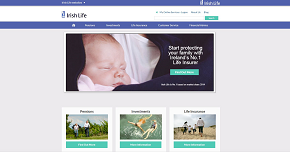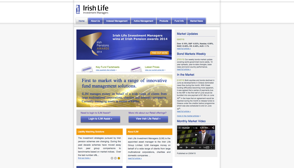Irish Life says early stage ‘mega deals’ may yet drive defined benefit fund deals to even greater heights.
Irish Independent - Fearghal O'ConnorIrish Life has seen a huge jump in its defined benefit buy-in business, a market that has now topped a billion euro per annum on the back of high interest rates.
The business involves the transfer of defined benefit schemes from the books of a company to that of large insurance firms such as Irish Life, which commands about 50pc of the Irish market.
Irish Life has seen record demand — with strong continued growth expected — for pension buy-ins over the past year as companies look to offload the risk of legacy defined benefit pension schemes from their balance sheets, said Shane O’Farrell, director of products at Irish Life Corporate Business.
“We expect the market to grow to €1bn per annum in 2023 and in the near future, with Irish Life having about a 50pc share of this.
“This is probably the biggest billion euro market of which most people have not heard. It’s really seen a massive level of growth from, typically, €200m per annum, up to €500m last year to, now, a billion euro likely this year,” said O’Farrell.
“This has been the norm in the UK for some time and we were surprised that there hadn’t been bigger take-up here but that is now changing.”
The market saw three or four transactions of €200m to €250m — and a number of smaller deals — to push it past the billion euro mark.
“But there are some really mega deals that are at very, very early stages that could even lead to a larger number in the future,” he said.
The rise in bond yields means a lot of defined benefit schemes are in a healthier position again, meaning firms are more likely to be able to transfer their defined benefit scheme without having to book a loss on their accounts
“Traditionally, this would have happened with schemes that were in wind-up where they had to do that. They were doing it from a position of weakness and often in deficit. But now we’re seeing schemes look at this from a position of strength. They’re doing it proactively.”
‘The cost of annuities has come down by 25pc’
The structure of a buy-in is that an insurance firm such as Irish Life receives a payment from the company in return for taking on its defined benefit scheme liabilities, which is a fixed amount. The insurance firm then invests the payment in such a way that it can pay the liabilities as they fall due and also earn a return on investment.
Irish Life is the largest insurer in Ireland and is owned by Canadian giant Great-West Lifeco. With an overall balance sheet of about €60bn, the pension buy-in business “is not material in the overall context of such a big balance sheet”, said O’Farrell.
“We also manage the exposure by reinsuring some of this outwardly to balance the mix of different risk types we have to the optimal level.”
The benefit for the other company is that it transfers the scheme off its balance sheet to Irish Life and it no longer has to worry about having insufficient funds to pay the liabilities and future calls on it to make good any shortfalls, said O’Farrell.
Many defined benefit schemes were closed to new members over the past decade.
Irish Life estimates the total Irish defined benefit market is €60bn and that much of this will transfer off the balance sheets of companies to insurance companies gradually in the years to come.
“As schemes start to mature, as the timeframes start to get a little shorter and as they start to reduce in numbers and get to a certain volume, then this buy-in option becomes more and more attractive for companies.”
The economic environment has added to this attractiveness, he said.
“The cost of annuities have come down by 25pc because of the big increase in interest rates so companies now have an opportunity to lock in that surplus, remove risk from their defined benefit schemes and get on with running their business rather than running a pension,” he said.
Some smaller schemes in particular were seeing an increased regulatory burden from stringent new IORP II rules applying to occupational pension schemes. Firms were also looking to “increase balance-sheet hygiene” and this would be seen as a positive action by shareholders.
The market tends to stay under the radar, said O’Farrell. “Confidentiality in relation to these types of deals tends to be crucial because trustees need to be very careful communicating it to the members of a scheme and to the pensioners. If it’s wrongly communicated it can cause upset.”
One of the biggest such buy-in deals to hit the news in recent years was in 2017 when Danske Bank transferred €335m of its Irish defined benefit pension liabilities to Irish Life in what was the largest such deal involving an Irish pension fund.








